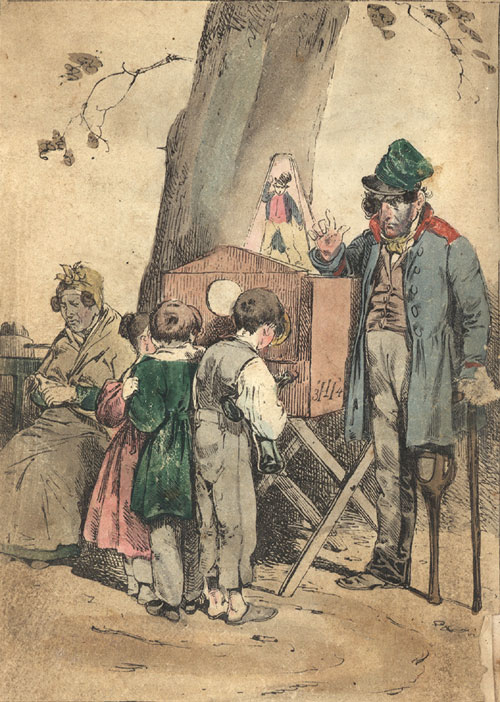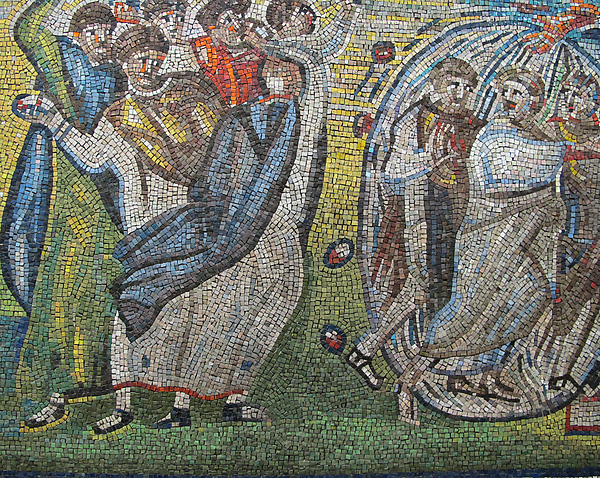
“A boy looks into a peep show…”
Here’s a bit of information you may not have known, about tables of content:
Pliny the Elder credits Quintus Valerius Soranus [ – who died in 82 B.C. and who is shown at lower left – ] as the first author to provide a table of contents to help readers navigate a lengthy work. Pliny’s own table of contents for his encyclopedic Historia naturalis (“Natural History”) may be viewed online in Latin and in English (following dedication).
 On the other hand, such a list of contents could be seen as a kind of “peep show,” as illustrated in the top image. (That is, it offers you a glimpse of “what’s inside…”) In other words, such a table -applied to this blog – can let you know what to expect to see.
On the other hand, such a list of contents could be seen as a kind of “peep show,” as illustrated in the top image. (That is, it offers you a glimpse of “what’s inside…”) In other words, such a table -applied to this blog – can let you know what to expect to see.
In another sense this page – and the blog itself – is all about color commentary. That is, one object of this blog is to provide color commentary on the Bible. (With an eye to going “beyond the fundamentals…”) And generally that means commentary on the readings for the upcoming Sunday.
(According to the Revised Common Lectionary.)
It also spends time on the psalms. (Which are almost as key to spiritual growth as the Gospels. For more on that see On the Psalms.) Another aside: If you’d like a book collection of these blog-posts – in either an e-book or old-fashioned paperback – check out the post, For a book.
For starters, you can get a a flavor of the blog by checking the category Not your daddy’s Bible.
 Or see the post from October 2014, “Gone Girl” and Lazy Cusses – Part II, with Sting – at right – commenting on “religion and religious people:”
Or see the post from October 2014, “Gone Girl” and Lazy Cusses – Part II, with Sting – at right – commenting on “religion and religious people:”
I don’t have a problem with God. I have a problem with religion. I’ve chosen to live my life without the certainties of religious faith.
I commented: “If your religion makes you ‘certain, ’you’re missing the point!” See also On “holier than thou” and On three suitors (a parable). (The latter cited a lady Muslim mystic, Rabia Basri).
For another vie, see “Holier than thou,” quoting H. L. Mencken, on “quacks:”
The only way that democracy can be made bearable is by developing and cherishing a class of men sufficiently honest and disinterested to challenge the prevailing quacks.
Which is pretty much what this blog is about. That’s why I say, “There are way too many so-called Christians who use the Bible and their faith as an excuse to close their minds. That’s why the sub-title to this blog is ‘Reading the Bible to expand your mind.’”
Or see On “expressio unius,” which said those fundamental readers who focus exclusively on the “letter of the law” pretty much rob the Bible of its intended effect.
Citing 2d Corinthians 3:6 and John 4:24, that post-column said such passages show “God doesnot want Good Christians to limit their reading, interpreting and living according to the Bible to a spirit-killing literalism…”
 Or see On Moses getting stoned, on why Moses may have had to “dumb things down” when writing the Torah…
Or see On Moses getting stoned, on why Moses may have had to “dumb things down” when writing the Torah…
The blog also reviews the Daily Office Readings from time to time. See Daily Office readings. And by the way, the Daily Office Readings is where the “DOR” in “Dorscribe” comes from. (For more on the Daily Office Readings, see DOR?)
There’s also a category, Reviews. Like the two-part “Gone Girl” movie review and Media Frenzy:
Shortly after Joe [Namath] signed with the Jets (for a record salary), a wise-guy New York reporter asked what he had majored in, down south at the University of Alabama; “Basket-weaving?” Joe answered, “No man, I majored in journalism. It was easier.”
In case I’m being too subtle, the point is that there’s a lot of wisdom in the Bible about not judging too quickly, and not getting caught up in today’s “media frenzies.”
Which is another way of saying there are more than enough quacks to challenge these days…

H. L. Mencken, the original “quack-challenger…”
The upper image is courtesy of Peep show – Wikipedia, the free encyclopedia. The caption: “A boy looks into a peep show device (illustration byTheodor Hosemann, 1835).” The article noted that while the term now generally applies to pornographic showings, “historically a peep show was a form of entertainment provided by wandering showmen.”
 For a more traditional table of contents, consider the one at left. (Christmas Carols, New and Old, published in 1867, and courtesy of hymnsandcarolsofchristmas.com.) The book was published by the Reverend Henry Ramsden Bramley (1833-1917) and Sir John Stainer (1840-1901). For more on the pair see Henry Ramsden Bramley – Wikipedia, and John Stainer – Wikipedia. The updated version of the first eight hymns/carols are included below (after the rest of the notes).
For a more traditional table of contents, consider the one at left. (Christmas Carols, New and Old, published in 1867, and courtesy of hymnsandcarolsofchristmas.com.) The book was published by the Reverend Henry Ramsden Bramley (1833-1917) and Sir John Stainer (1840-1901). For more on the pair see Henry Ramsden Bramley – Wikipedia, and John Stainer – Wikipedia. The updated version of the first eight hymns/carols are included below (after the rest of the notes).
Re: The RCL. “A lectionary is a collection of readings or selections from the Scriptures, arranged and intended for proclamation during the worship of the people of God…” For more see About the Revised Common Lectionary (RCL) – Consultation on Common Texts, and Revised Common Lectionary – Wikipedia.
Re: “muling it over.” The actual expression would be “mulling it over,” meaning tothinkabout, ponder or worry about something. (In the alternative, to “think about (a fact, proposal, orrequest) deeply and at length: [as in:] “she began to mull over the various possibilities.” The variation-on-a-theme came from John Steinbeck’s Travels with Charley.
The quote is from the 1980 Penguin Books edition, at page 11. Steinbeck wrote of packing“Rocinante” for a trip around America, and his capacity for self-delusion. He packed ample – and heavy – writing supplies, including reams of paper, a typewriter, and “enough writing material to write ten volumes.” This despite 30 years experience: “I cannot write hot on an event. It has to ferment. I must do what a friend calls ‘mule it over’ for a time before it goes down.”
An additional FYI: “TWC” was based on Travels with a Donkey in the Cévennes (1879), by Robert Louis Stevenson (Wikipedia), of which more in posts including Donkey travel – and sluts.
Re: quote from Sting. See 10 Questions for Sting – TIME.
The lower image is courtesy of greatmindsonrace.wordpress.com/2011/10/09/h-l-mencken, which spoke of Mencken’s “sometimes cynical and acerbic writings attack[ing] the holy ideals of his age, including religion, business, government and the press.” He knew he couldn’t change society; his goal was “to make life ‘measurably more bearable for the civilized minority in America.’”
The “quacks” quote is from Mencken’s 1956 book Minority Report. See also Minority Report Quotes by H.L. Mencken – Goodreads.
* * * *
Note that as originally published, this post was about the Bible readings for May 4, 2014. The complete text of that post follows, but without the illustrations:
The RCL Bible readings for Sunday, May 4, are:
Acts 2:14a,36-41,
Psalm 116:1-3, 10-17,
1 Peter 1:17-23,
and,
Luke 24:13-35
The first reading, Acts 2:14a, 36-41, has been identified as the Apostle Peter’s Pentecostal Sermon.
Acts – also known as Acts of the Apostles – is the first book of the New Testament after the Gospels, and is generally attributed to the same Luke who wrote the third Gospel. Notice that the reading for May 4 has the same beginning as the one for April 27: “Peter, standing with the eleven, raised his voice and addressed the multitude…”
Both readings take place right after “the day of Pentecost,” when the “gift of the Holy Spirit” was given to the newly-formed community of believers, many of whom “spoke in tongues.” But note: they didn’t speak in the gibberish “tongues” often found in some of today’s churches. The “speakers” spoke in a distinct, identifiable language so visitors from other countries got bewildered, “because each one heard them speaking in the native language of each.” (Remember, the “speakers” were ignorant, backwater rubes from the boondocks of Galilee.)
But we’re getting ahead of ourselves. . . The readings in the Easter Season – the season from Easter Day to Pentecost Sunday – are all from after the Day of Pentecost itself. On June 8, 2014 (Pentecost Sunday), one of the non-Gospel readings will be from the beginning of Acts, Chapter 2 (which we may call editorial license).
Anyway, many of Peter’s listeners were “cut to the heart” and asked what to do. Peter said repent and be baptized, so they too could get the gift of the Holy Spirit. (A kind of “spiritual boot camp” drill instructor, but one able to balance tough love with humor and compassion…)
The reading ends, “So those who welcomed his message were baptized, and that day about three thousand persons were added.”
The International Bible Commentary (IBC) calls Psalm 116 a psalm of “thinking and thanking… This beautiful psalm of thanksgiving owes its charm to the psalmist’s [personal] experience of God’s grace and its spiritual impact upon him.”
Which brings up the distinction between trying to prove the “truth” of the Bible by proving the actual physical existence of Noah’s Ark – for example – as opposed to proving its truth by showing what the Bible experience has done for you personally.
Take – for example – the man with the “legion” of demons, told in Mark 5:1-19 (that formed the basis for the 1973 film The Exorcist). The story ends: “And he went away and began to proclaim . . . how much Jesus had done for him; and all men marveled.”
Note also page 339 of the Book of Common Prayer: “we are very members incorporate in the mystical body of thy Son. . .” That indicates the two sides of any Christian church: the corporate, business, “bean-counting” side, as opposed to the side encompassing the Church’s true mission: fostering the mystical, personal experience in each and every church-goer, no matter how long that may take, but we digress. . .
Getting back to the readings, 1 Peter 1:17-23 begins like this: “If you invoke as Father the one who judges all people impartially according to their deeds, live in reverent fear during the time of your exile.” The point being that a true Christian believes this life on earth is just a starting point, a jumping-off point for a better life ahead.
(See also Psalm 119: 19, “I am a stranger here on earth.”)
Sometimes – like New Jersey – Earth is a good place to be from.
The Gospel-reading will be discussed in the following post.